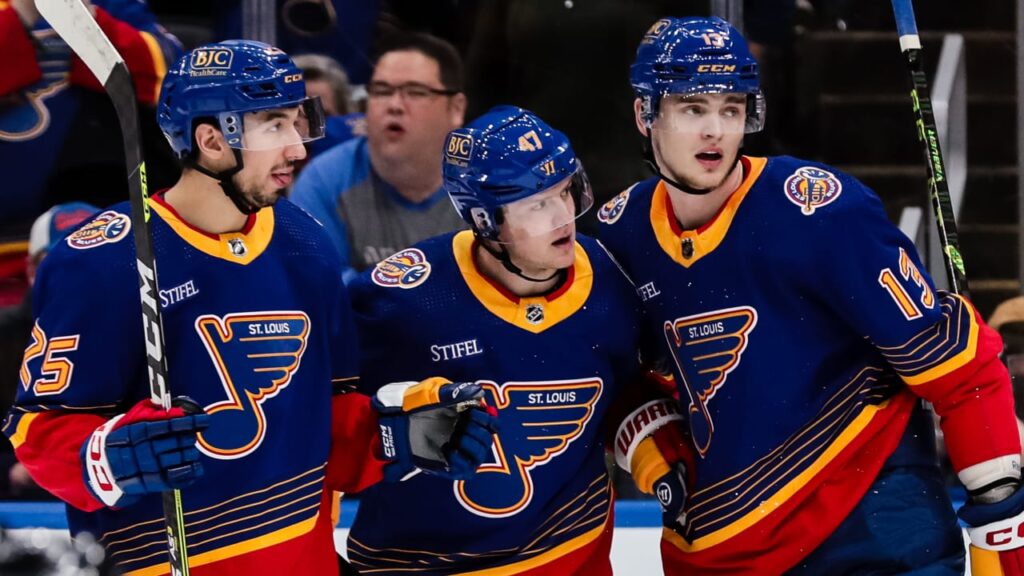Team History
The St. Louis Blues were born out of the great NHL expansion in 1967. They were one of six new franchises welcomed into the league, designed to broaden the reach of professional hockey across North America. The Blues quickly endeared themselves to the city of St. Louis, their passionate fanbase becoming renowned throughout the league.
Despite their status as a new team, the Blues achieved incredible success in their early years. This success propelled them into a position as a serious contender within the league, establishing a foundation that would carry them through decades of competition.
Foundation and Early Years
The Blues were named after the classic musical composition “Saint Louis Blues” by W.C. Handy, highlighting a strong connection to the city’s vibrant musical history. From the start, the franchise was built on a foundation of hard work and an underdog mentality. Under the leadership of their first coach, the legendary Scotty Bowman, the Blues were determined to prove themselves in the expanded NHL.
Their inaugural season in 1967-68 saw the Blues make a splash, shocking much of the hockey world with their grit and determination. The team’s relentless style of play and the brilliance of goaltender Glenn Hall became hallmarks of the early Blues era.
Notable Early Achievements
The Blues’ early years were remarkably successful. They made history by reaching the Stanley Cup Finals for three consecutive seasons from 1968 to 1970. While they were ultimately swept each year by the powerhouse Original Six teams, these Finals appearances cemented the Blues as a legitimate force in the NHL.
Individual Blues players also shone during this period. Goaltender Glenn Hall and defenseman Jacques Plante shared the Vezina Trophy (awarded to the league’s top goaltenders) in 1969. Forward Red Berenson became a fan favorite, and the “Plager Brothers” (Barclay, Bob, and Bill) established themselves as a formidable defensive trio known for their physical style.
Periods of Change
The 1970s and 1980s proved more challenging decades for the St. Louis Blues. Despite consistent playoff appearances, the elusive Stanley Cup remained out of reach. The team underwent numerous changes in ownership, coaches, and star players. However, during this time, they also saw the emergence of new stars like Bernie Federko, Brian Sutter, and Brett Hull, who would later play a pivotal role in the franchise’s history.
The Blues experienced a brief resurgence in the early 1990s with the acquisition of players like Brendan Shanahan and Curtis Joseph. This team’s offensive prowess revitalized the fanbase. Though they were unable to capture the ultimate prize, this era served as a stepping stone towards future success.
Championships and Achievements
The long wait for a Stanley Cup championship finally ended for the St. Louis Blues in the 2018-19 season. The team, led by interim coach Craig Berube, embarked on an improbable playoff run after having the worst record in the league in January. They overcame adversity to defeat the Boston Bruins in a thrilling seven-game Stanley Cup Final, bringing the first-ever Cup win to the city of St. Louis.
Beyond their Stanley Cup triumph, the Blues boast a significant number of playoff appearances throughout their history. They are one of the most consistent teams outside the NHL’s Original Six in terms of postseason qualifications, reflecting their longstanding competitive spirit.
Current Roster
The current St. Louis Blues roster features a blend of veteran leadership and exciting young talent. Key forwards include Ryan O’Reilly, Vladimir Tarasenko, Jordan Kyrou, and Robert Thomas. On defense, the Blues are anchored by veterans Colton Parayko, Torey Krug, and Justin Faulk. In goal, Jordan Binnington provides stability and has proven his ability to win big games.
The team’s young core is particularly promising, with players like Robert Thomas and Jordan Kyrou taking on significant roles and gaining valuable experience with each passing season.
Management and Coaching Staff
The Blues’ front office is led by General Manager Doug Armstrong. Armstrong has held the position since 2010 and is highly respected for his ability to build competitive rosters through both trades and the draft. He is known for his calculated decision-making and his focus on constructing teams with depth and versatility. Armstrong’s tenure has been marked by the Blues’ consistent playoff appearances and their historic Stanley Cup victory in 2019.
Craig Berube, the mastermind behind the Blues’ 2019 Stanley Cup run, remains the team’s head coach. Berube took over as interim head coach midway through the 2018-19 season and transformed a struggling team into champions. His no-nonsense approach, emphasis on defensive responsibility, and ability to motivate his players have earned him the trust of the Blues’ organization and the admiration of the fans. Berube is supported by assistant coaches Steve Ott and Mike Van Ryn, as well as goaltending coach David Alexander.
Home Stadium Information
The St. Louis Blues play their home games at the vibrant Enterprise Center, located in the heart of downtown St. Louis. The arena has a capacity of over 18,000 and is known for its electric atmosphere during Blues games. The loyal St. Louis fanbase packs the Enterprise Center, creating an intimidating environment for visiting teams.
Beyond hosting Blues hockey, the Enterprise Center is a multi-purpose venue that attracts major concerts, family shows, and other sporting events. The arena has undergone renovations in recent years to enhance the fan experience with upgraded amenities, diverse food options, and improved concourse areas. The Enterprise Center stands as a vital landmark in the St. Louis sports and entertainment landscape.
-
*********** ***** ******* *** ***** ** ************ **** ********* *****dd.mm.yyyy 00:00 PM
-
****** *********** **** ** ***** ****** *** **** *** ******: ********* *** ******* *** ****'* ****dd.mm.yyyy 00:00 PM
-
*********-***** ********: **** 6 **** *** ***** *** * ********* **** 7dd.mm.yyyy 00:00 PM
-
**********-************ *******: ****** ****ć, ******* *******, *** * ********* ********** ********dd.mm.yyyy 00:00 PM
-
********* **** ********* ** *** ***: ********* *** ********* ** ****** ******** **. *** *** *****dd.mm.yyyy 00:00 PM
-
****************** ******* **********: *** ********' **** ****dd.mm.yyyy 00:00 PM







